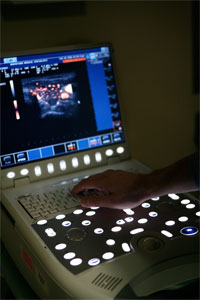Research and Clinical Trials

As a major site for National Institutes of Health (NIH)-funded basic and clinical research, the Diabetes Research Center has participated in several major studies. The landmark Diabetes Control and Complications Trial showed that good control of blood glucose levels can prevent the complications of diabetes.
Another clinical trial, the Diabetes Prevention Program, involved people at high risk of developing type 2 diabetes; it found that modest weight loss and regular exercise can delay and possibly prevent the development of diabetes in these high-risk people.
Montefiore was also one of the major recruitment centers for the international BARI 2D trial that compared treatment strategies for patients who have both type 2 diabetes and heart disease.
Our participation in this and other major diabetes studies insures that the care we provide our patients is based on the latest research and innovative approaches to treatment. Learn more about our ongoing research endeavors.
Taking Part in Our Research
The Division of Endocrinology is currently recruiting participants for the following clinical studies:
Resveratrol Studies
Resveratrol is a natural substance found in grapes and red wine and is used as a dietary supplement. Doctors at Albert Einstein College of Medicine's Diabetes Research Center are studying whether resveratrol can lower blood sugar levels in people who are at risk for type 2 diabetes.
"Our early studies suggest that resveratrol may help lower blood sugar and improve blood vessel function in older adults who are at risk for diabetes," says Dr. Jill Crandall, who recently received a grant from the American Diabetes Association to conduct research on this promising treatment.
Dr. Meredith Hawkins and Dr. Preeti Kishore are also studying resveratrol to learn if it can increase muscle metabolism and improve the body's response to insulin. Those who are at risk for diabetes (i.e., people who are 50 or older, are overweight and/or have a family history of type 2 diabetes) may be eligible to join these studies.
For more information about the resveratrol studies, call Saritha Kesanolla at 718-405-8270 or Stephanie Lawrence at 718-430-2903.
Vitamin D and Metabolism Study
Does treatment of low vitamin D levels improve metabolism and reduce the risk of type 2 diabetes?
You may be eligible if: You are between the ages of 21-60 and overweight and may be at risk for diabetes.
Researcher: Dr. Preeti Kishore
Time: Eight visits over a period of four months
Compensation: You will receive payment for your time and travel.
For more information, call Stephanie Lawrence at 718-430-2903.
The Brain and Blood Sugar Metabolism Study
A study to explain how the brain regulates blood sugar metabolism
You may be eligible if: You are aged 21-60 and have type 2 diabetes or are aged 21-60 and are healthy with no history of diabetes
Researcher: Dr. Meredith Hawkins
Time: Three visits, including 2 overnight visits resting in bed and having an IV put in each arm.
Compensation: You will receive payment for your time and travel.
For more information, call Stephanie Lawrence at 718-430-2903.
Low Testosterone and Older Men Study
Will treatment of low testosterone improve the health of older men?
You may be eligible if: You are a man aged 65 or older and you have trouble walking, have low energy, or have decreased interest in sex.
Researchers: Drs. Jill Crandall and Eric Epstein
Time: Eight visits at the clinic during the first year and one follow-up visit during the second year. You will get a testosterone gel or placebo gel to use during the study.
Compensation: Provided for time and travel.
For more information, call the Clinical Trials Unit at 718-405-8271.


